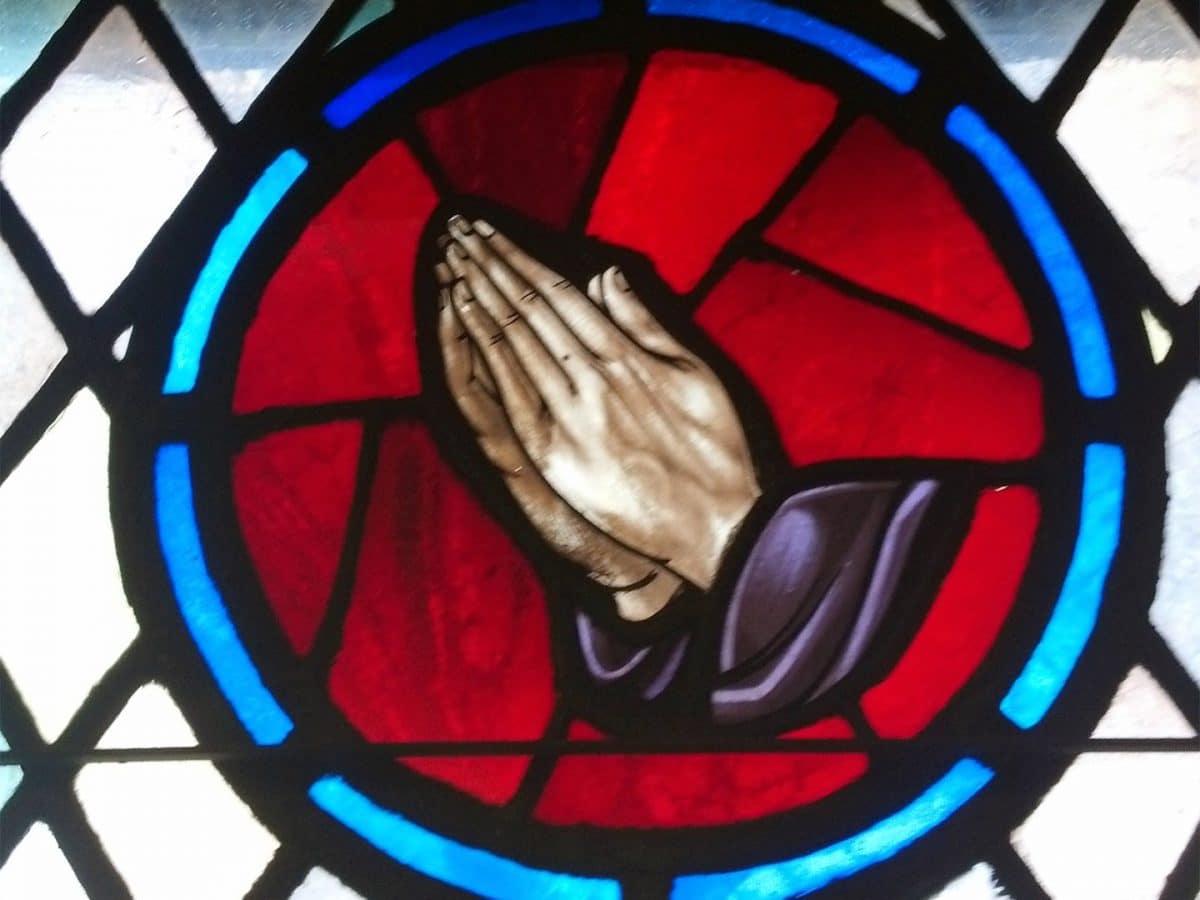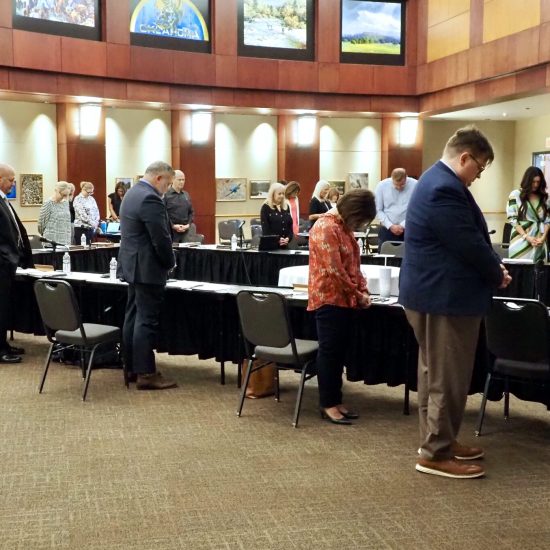
LONDON (RNS) — The tattoo spelling “GOD” sits prominently between the man’s eyebrows, a letter disappearing with every furrowed expression.
The green ink, which draws sideways glances from nearby tables as Arash sips his cappuccino, would swiftly get him arrested or killed back home, apostasy being a crime of the highest order. But the British courts were not so convinced of his newfound religious beliefs.
Arash, an Iranian who converted from Islam to Christianity and sought asylum in the U.K., has had a difficult time proving he is really Christian. Immigration officials were skeptical when they read his application and saw the pictures of his permanent brow, said Arash, whose name has been changed by request to protect his family members who remain in Iran.

A stained glass window of praying hands. Photo by Robert Adamski/Creative Commons
“The home office thought it was fake,” Arash told Religion News Service, referring to the ink he got in 2017.
“They think he did that for some effect, but he didn’t,” Maria Wilby, director of the Refugee, Asylum Seeker and Migrant Action group, said over the phone.
“In the midst of ill health, of having an operation this year, he has not lost touch with the church. He is finding solace in God,” Wilby said, adding that religion is “probably the only thing that’s kept him alive.”
Converts fleeing religious persecution make up the biggest chunk of claims from Iranian asylum-seekers coming to RAMA for help, according to Wilby.
The Islamic Republic forbids anyone born Muslim from converting to another religion, with violations punishable by arrest and even death. There are about 1.25 million Christians in Iran and those born Christian are allowed to practice their beliefs in the shadows, but converts face increasing persecution, including mass arrests last summer. In addition to government pressure, converts are often exiled from families or forced into Islamic marriages, according to Open Doors International, a watchdog monitoring global Christian persecution.
But converts who have fled Iran are finding it much harder to prove their faith once they cross the border.
“The things that one does to articulate a genuine Christian faith are very difficult objectively to prove. So much of the question of faith is about our relationship between us and God and that can’t be verified in one sense in court,” said Mark Wallace, the priest at St. Peter’s Colchester Church who testified on behalf of Arash.
Wilby agrees. “How do you prove those things? Membership is something that’s prescribed,” she said, arguing that the current requirements to be determined a “practicing Christian,” such as church attendance, are unreasonable.
“We’ve had Christian clients who were four miles from the church and there was no transport on a Sunday, so what are they supposed to do, how are they supposed to prove that they are still practicing?” Wilby said.
“If you’re living in a hotel on 9 pounds a week, you’re not going to spend the little money you have getting a one-way taxi into town to attend church, and it would be unreasonable to expect you to,” she added.
There are, however, certain behaviors that strongly indicate authenticity, Wallace stresses. Commitment to regular worship, to serving others, to being kind and sacrificially generous is a “good demonstration of someone’s commitment.”
In most cases, including Arash’s, a letter of recommendation from the local priest is not enough to move the needle. But in-person testimony sometimes takes applicants over the finish line. The judge on Arash’s case said he found Wallace’s oral testimony “to carry significant weight in support of the appellant’s apostasy,” noting his multiyear relationship with Arash.
“Reverend Wallace baptized the appellant personally and is shown in the photographs doing so,” Judge John Hills said in his decision granting Arash asylum.
As challenging as it might be to prove religious conversion in the U.K., applicants can face even steeper barriers in Germany and Austria.
The U.K.’s grant rate for Iranian asylum-seekers is 80%. In comparison, data from the German government shows that just 22.3% of Iranian asylum claims in 2019 were successful in first decisions, dropping to 19.9% on appeal. As in the U.K., German state officials report that religious conversions to Christianity are the “most frequent reason for asylum claims by Iranians,” according to a 2021 study published in the Annals of the American Academy of Political and Social Science.
The study, based on 36 asylum appeal hearings in Germany, found that judges largely expect applicants to show church attendance is not motivated by a desire to form social bonds. As a result, joining an Iranian-only congregation with Farsi liturgy could be held against applicants — even though many do not know English.
In one case analyzed in a study published in the Journal of Legal Anthropology in 2021, an Iranian applicant forgot his baptismal verse and could not recite it in court. When his lawyer stated that she could not remember hers either, the judge rebuffed her.
“But we didn’t convert to Christianity under the threat of the death penalty. We also did not claim asylum based on our faith that is so strong, and so formative for our identity, that we cannot return to our country of origin,” the judge is quoted as saying.
In Germany and Austria, there appears to be a distinction between state-recognized churches that receive tax funds, such as Roman Catholic and Reformed churches, and “free churches” financed with membership donations, including the Free Evangelical-Lutheran or Free Protestant churches.
Rumors about assembly-line baptisms at these free churches have been openly discussed in court, with one judge saying he did not believe there was “real spiritual conversion there.” The judge also suggested asylum-seekers often seek out these places of worship for the feeling of community rather than faith.
The U.K. has similar worries despite its relatively higher approval rate, Wallace notes.
“There is a concern that baptism as a sacrament could be being administered without due care and attention,” he said, that “people can be trying to play the system, and that if it is purely about a one-off sacrament that can be administered on one Sunday, that becomes a sacrament that could then be open to being exploited.”
Such concerns have been recently aggravated by an incident in South London, when earlier this month a man attacked a woman and her two children with a corrosive substance, injuring 12 people in total. Amid an ongoing nationwide manhunt for the attacker, believed to hail from Afghanistan, a spotlight has been fixed on the fact that he was rejected twice for asylum — and then accepted on his third attempt because of his conversion to Christianity. A body believed to be the chemical attacker’s was reportedly pulled out of the River Thames this week.
Fears over the ease of religious conversion claims appear to be growing. Forty asylum-seekers in a barge that arrived in Dorset, in southwest England, also recently made the news after claiming they were practicing Christians or were inquiring about their faith. Six of them got baptized on Feb. 4, according to The Telegraph. Weymouth Baptist Church has insisted the baptism requests were genuine, but the home secretary has asked for information on these conversions.
Nigel Farage, a former leader of the populist right-wing U.K. Independence Party who was a prominent Brexit supporter and is now a broadcaster, fanned the flames in a YouTube video from Feb. 6 in which he accused the Church of England of being complicit in the acid attack.
“How many hundreds or thousands of people who come from Muslim countries, who now claim they are Christian and have been allowed to stay?” he asked.
“We must be mad,” he added.
A day later, a conservative member of Parliament suggested taxpayers were being “scammed” by the archbishop of Canterbury, saying, “So Christianity in the U.K. seems to be on the wane unless, apparently, you are from a Muslim country in the middle of an asylum claim.”
Prime Minister Rishi Sunak replied by stressing the importance of pushing forward his plan to deport migrants to Rwanda — a proposal the Supreme Court recently shot down, ruling it would be unlawful.
A tattoo and a priest’s testimony helped convince the judge in Arash’s case, but it might not convince many politicians.






